A new survey by the University of Maryland’s Program for Public Consultation has found that large majorities of American voters support removing barriers to economic opportunities, housing, and voting for people with criminal records.
One in three adults in the United States currently have a criminal record, many for being arrested but never charged, or charged but never convicted, and many for minor and non-violent offenses.
This social media toolkit can help spread awareness about public support for reform that limits the impact of these records.
Second Chances Social Media Toolkit (PDF)
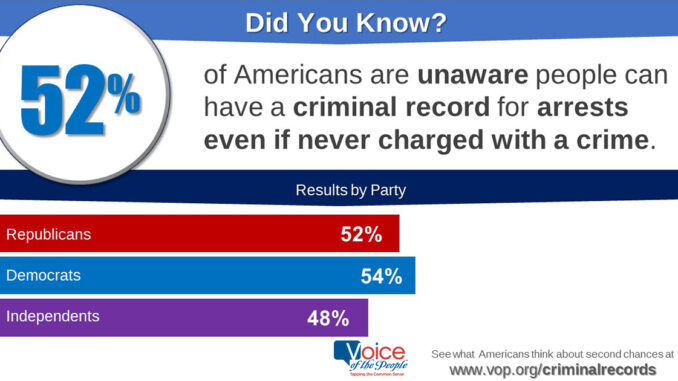 Did you know that people can have a criminal record for an arrest when they were never charged with a crime or convicted? #SecondChanceMonth Did you know that people can have a criminal record for an arrest when they were never charged with a crime or convicted? #SecondChanceMonth
|
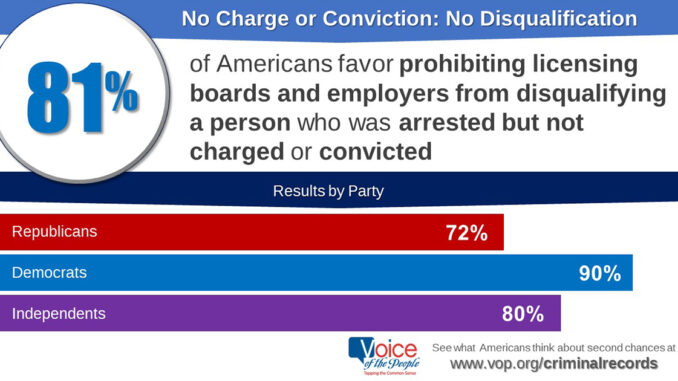 8 in 10 Americans want to prohibit employers from disqualifying from a job someone who was arrested but never charged or convicted #SecondChanceMonth 8 in 10 Americans want to prohibit employers from disqualifying from a job someone who was arrested but never charged or convicted #SecondChanceMonth
|
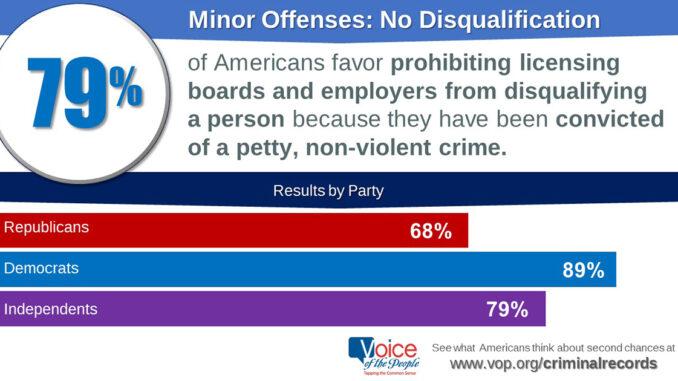 Employers and professional licensing boards can disqualify workers who have been convicted of a petty, non-violent crime. Huge majorities of Democrats, Republicans, and Independents think that should change #SecondChanceMonth Employers and professional licensing boards can disqualify workers who have been convicted of a petty, non-violent crime. Huge majorities of Democrats, Republicans, and Independents think that should change #SecondChanceMonth
|
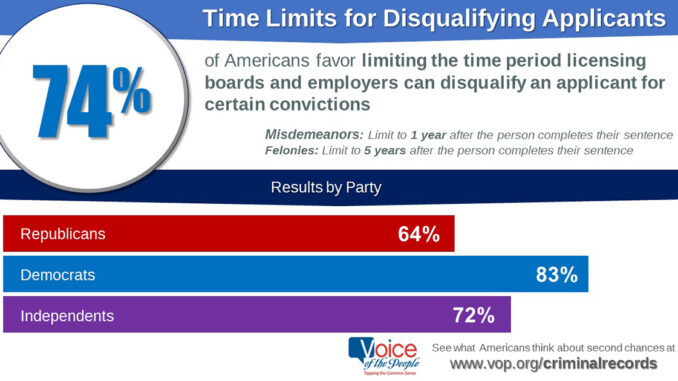 3 in 4 Americans want to limit the time period after serving sentences that workers can be disqualified from jobs and professional licensing #SecondChanceMonth 3 in 4 Americans want to limit the time period after serving sentences that workers can be disqualified from jobs and professional licensing #SecondChanceMonth
|
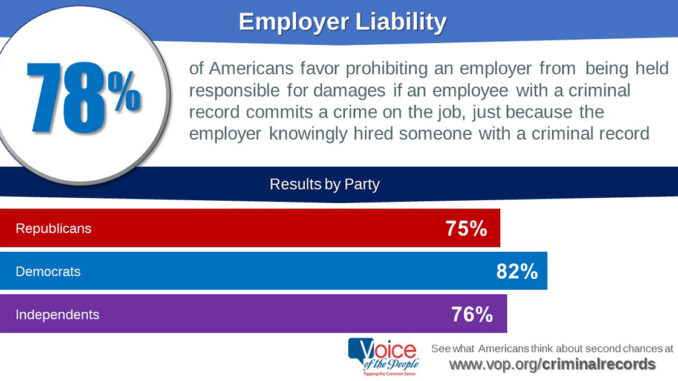 Across the US, employers make hiring decisions based on laws that hold them responsible for damages done by someone they knowingly hired with a criminal record. Large majorities of Republicans, Democrats, and Independents believe we must end this practice #SecondChanceMonth Across the US, employers make hiring decisions based on laws that hold them responsible for damages done by someone they knowingly hired with a criminal record. Large majorities of Republicans, Democrats, and Independents believe we must end this practice #SecondChanceMonth
|
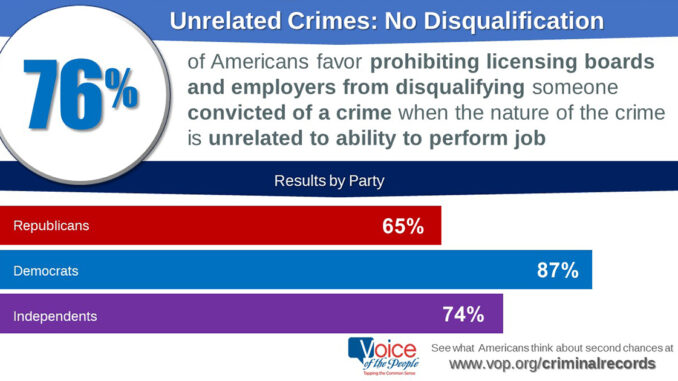 There are over 44,000 rules prohibiting people with criminal records from jobs, professional licenses and public housing. Americans want change, with 76% saying people should not be disqualified from a job for convictions having nothing to do with the work #SecondChanceMonth There are over 44,000 rules prohibiting people with criminal records from jobs, professional licenses and public housing. Americans want change, with 76% saying people should not be disqualified from a job for convictions having nothing to do with the work #SecondChanceMonth
|
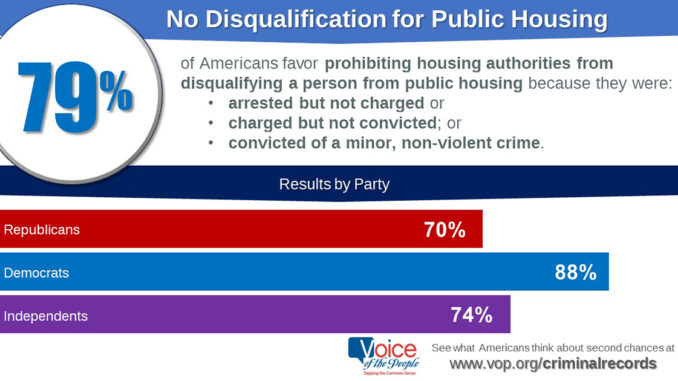 In 2019, @KamalaHarris and @AOC introduced the Fair Chance at Housing Act which restricted the use of criminal records by public housing authorities. 8 in 10 Americans want to end blocking people from public housing because of arrests without conviction or non-violent offenses. In 2019, @KamalaHarris and @AOC introduced the Fair Chance at Housing Act which restricted the use of criminal records by public housing authorities. 8 in 10 Americans want to end blocking people from public housing because of arrests without conviction or non-violent offenses.
|
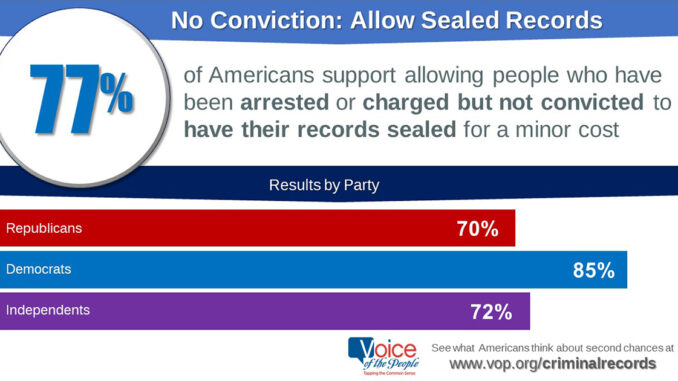 Did you know if you have been arrested, but not charged or convicted of a crime, you may have a criminal record for the rest of your life? More than 3 in 4 Americans believe that anyone who has not been found guilty should be able to have their records sealed #SecondChanceMonth Did you know if you have been arrested, but not charged or convicted of a crime, you may have a criminal record for the rest of your life? More than 3 in 4 Americans believe that anyone who has not been found guilty should be able to have their records sealed #SecondChanceMonth
|
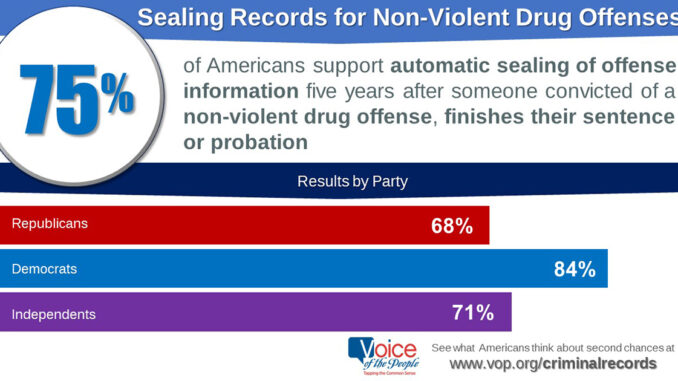 The @WhiteHouse declared April is #SecondChanceMonth. Huge majorities of Republicans & Democrats agree that someone convicted of a non-violent drug offense should have their records automatically sealed five years after their sentence or probation. The @WhiteHouse declared April is #SecondChanceMonth. Huge majorities of Republicans & Democrats agree that someone convicted of a non-violent drug offense should have their records automatically sealed five years after their sentence or probation.
|
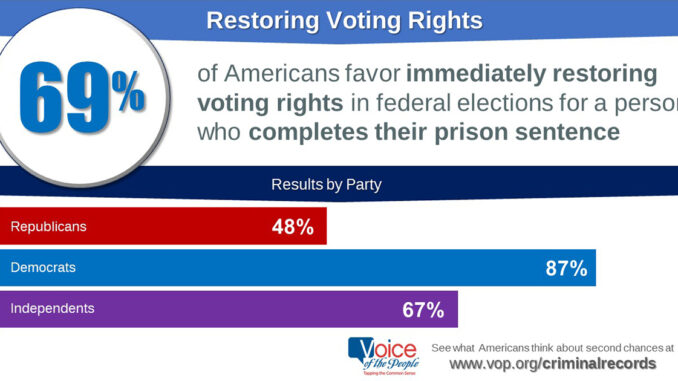 In 2020, more than 5 million people with felony convictions were not allowed to vote. In PPC’s 2021 survey, 69% of Americans favor immediately restoring voting rights in federal elections for a person who completes their prison sentence. Survey Results: www.vop.org/criminalrecords In 2020, more than 5 million people with felony convictions were not allowed to vote. In PPC’s 2021 survey, 69% of Americans favor immediately restoring voting rights in federal elections for a person who completes their prison sentence. Survey Results: www.vop.org/criminalrecords
|
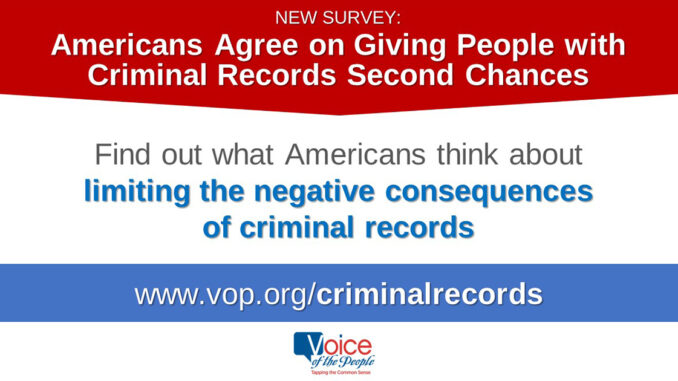 Most Americans, Rs and Ds alike, agree on giving people with criminal records second chances. A new survey by UMD’s Program for Public Consultation finds large majorities want to change how we treat people with criminal records in our society. Survey: www.vop.org/criminalrecords Most Americans, Rs and Ds alike, agree on giving people with criminal records second chances. A new survey by UMD’s Program for Public Consultation finds large majorities want to change how we treat people with criminal records in our society. Survey: www.vop.org/criminalrecords
|
